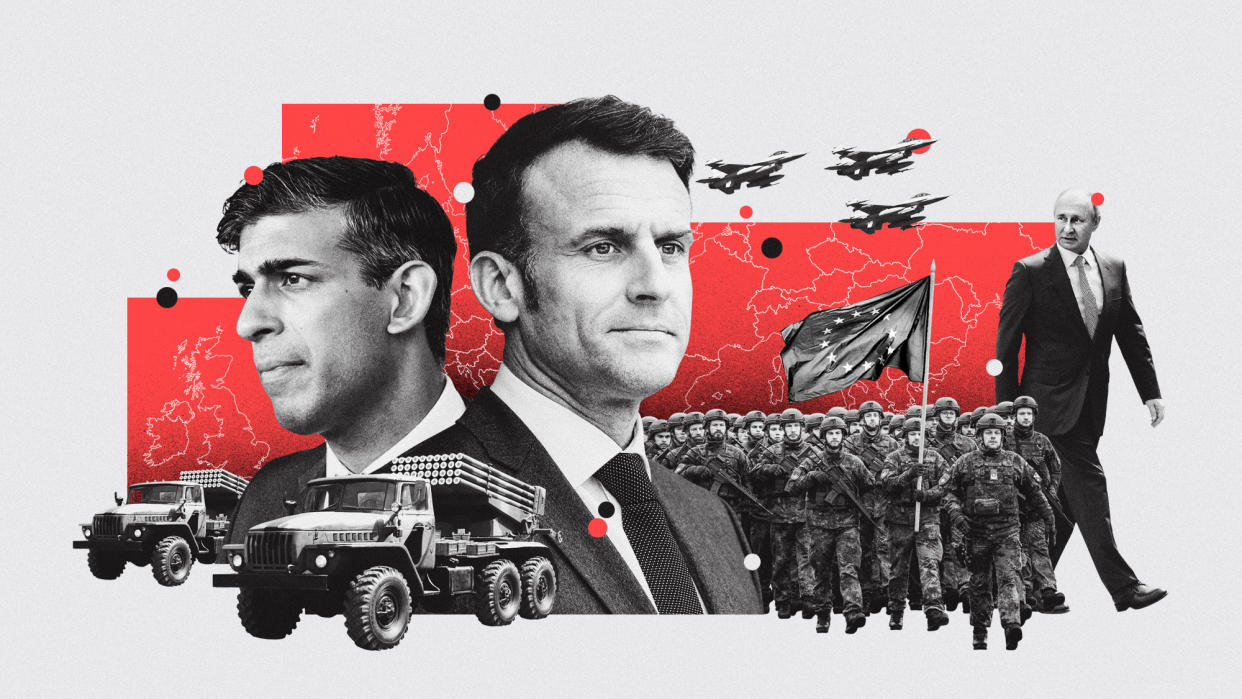Is Europe ready to come to its own defense?

Europe needs to be ready to go it alone. After decades of relying on the United States and NATO to shoulder the burden of its defense, Reuters said, French President Emmanuel Macron last week declared that the continent must build "stronger, more integrated European defenses." That means building industrial capacity and its own anti-missile shield. Russia's invasion of Ukraine has made the need clear, Macron said. "There is a risk our Europe could die. We are not equipped to face the risks."
Nuclear weapons may also be part of the mix. France already has an atomic arsenal, The Wall Street Journal said, but it may be time to "Europeanize" those weapons to protect the country's allies from attack, Macron said over the weekend. "This deterrence contributes to the credibility of European defense," he said in an interview. Other European countries might be ready to go along: Some German officials are reportedly looking to France and the U.K. to provide a nuclear umbrella for the continent "should the U.S. no longer be willing to fulfill that role."
That willingness (or lack thereof) was hovering over Macron's remarks. Former President Donald Trump might be in the White House next year, and he has made clear his antipathy to NATO. "Macron has no illusions about the future of U.S. commitment to European security," Gérard Araud said at the Atlantic Council blog. Even if President Joe Biden wins reelection, some level of "disengagement" by America is probably coming: "Brutal with Trump, gradual with Biden."
What did the commentators say?
"Europeans need to get their act together on defense," Kate Hansen Bundt said at Carnegie Europe. But that should be in the context of a "strengthened European pillar" of NATO — not a Europe-only approach. Post-Brexit Britain is part of NATO but not the European Union, so moving forward with an EU-centric defense strategy would mean excluding "Europe's strongest military power." France should take the lead in coordinating "true European capabilities" within NATO, to make Macron's vision become reality. "Visions are one thing; concrete action is what matters."
Macron has been calling for "European security and strategic autonomy" since he first took office in 2017, Carine Guerout and Jason C. Moyer said at the Wilson Center. Russia's attack on Ukraine spurred his original vision into something closer to reality. Now "military budgets are reaching unprecedented levels." With his latest speech, Macron has positioned himself as a "disruptor" to decades of received wisdom about European security arrangements. "At the very least he does not accept the current order and is willing to openly question it."
The French leader "is determined to make a lasting impact on the EU," Ania Nussbaum said at Bloomberg. Macron is "well positioned to advocate for Europe" but the next step requires that his "ideological victories translate into concrete action." That might be a problem. Macron's peers think he's better at grandstanding than "quiet diplomatic coordination" with his colleagues. And while France has increased its defense production, the "continent is nowhere near being the 'war economy' that Macron proclaimed in the summer of 2022."
What next?
There is some action, however. Britain last week pledged to boost its own defense budget by £75 billion over six years to "pile pressure on European allies to follow suit," said Politico. "We can't keep thinking America will pay any price or bear any burden if we are unwilling to make sacrifices for our own security," Prime Minister Rishi Sunak said during a visit to Poland.
But it's not clear when — or if — Europe will be able to stand on its own. "Many E.U. officials believe there is currently no credible alternative to the U.S. military umbrella," said NBC News. But Macron insists the continent has no choice but to prepare. "The United States has two priorities: the United States first and the China question second," he said. "The European question is not a geopolitical priority."
Solve the daily Crossword

